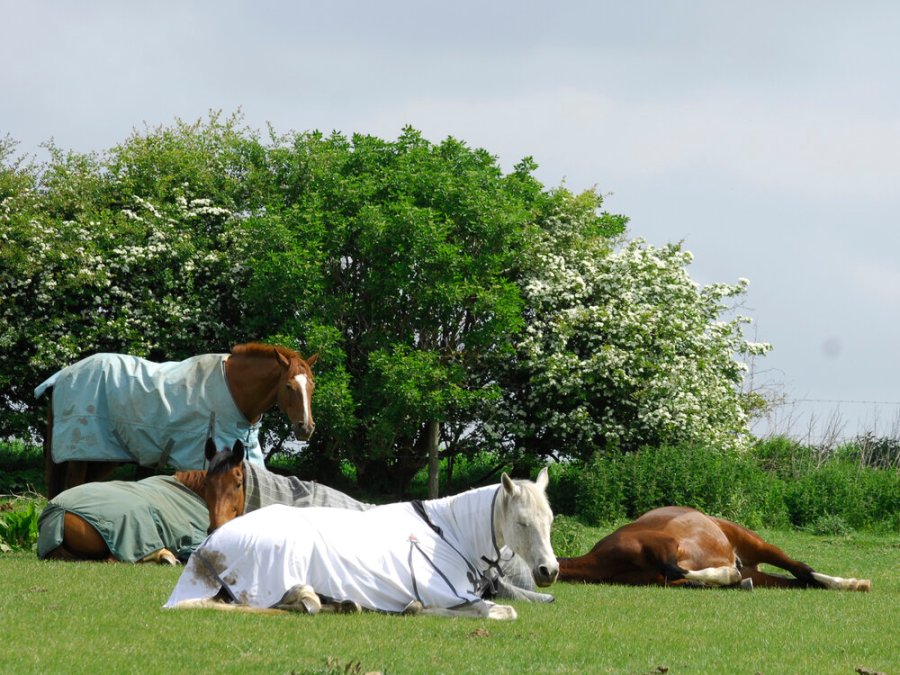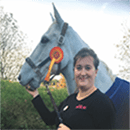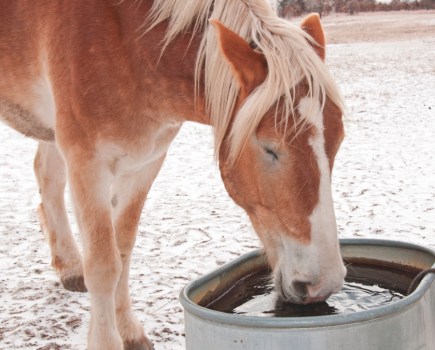No human being on the planet can function, or even live, without sleep — and neither can horses. In fact, the quality and quantity of a horse’s sleep directly affects their health and wellbeing. However, sleep is rarely considered as part of a horse care routine and management plan.
Horses are like other species and they don’t need a lot of sleep. Their sleep is divided up into three types:
- The first state of sleep is a snooze-type (light) sleep. The dozing in the back of their stable that you may have seen them doing.
- The secondary sleep is a true sleep, which is a deep, but it’s not Rapid Eye Movement (REM) sleep.
- Stage three is REM sleep.
Horses do sleep types one and two while standing, but REM sleep can only happen when they lie down, because it requires complete relaxation. A study during the 1980s revealed that horses need two to three hours of sleep every day and, of that, they need at least half-an-hour to an hour’s worth of REM sleep.
How do horses sleep?
Could you sleep while standing up? Unlikely. I can fall asleep on the sofa (usually waking up just in time to see a film’s end credits) or while being driven in the car very easily. If I were to fall asleep while standing, I’d fall on the floor within the seconds.
This isn’t a concern for horses, though, as they have a clever and unique ‘stay apparatus’ in their bodies which acts as a stabiliser to enable them to sleep. This is an anatomical mechanism which locks a hind leg in place to keep horses upright. It consists of the patella, which is located in the stifle joint on the hind leg and will pop out of place to lock the hind leg into the standing position.
The stay apparatus only locks into place in one hind leg. The other hind limb will be relaxed. It may seem like your horse is leaning, because the hindlegs are doing different things and means their pelvis is not level. When the horse wakes up, they simple unlock the patella and start moving again.
Horses are designed to sleep standing up because they are prey animals. If they are standing up, they can make a quick getaway should a predator appear. Those few extra seconds it takes a horse to get up from the lying position could be the difference between life and death. That’s why horses will only have REM sleep if they are somewhere they feel completely safe, because then they will lie down.
A second reason for sleeping standing up is that horses are large animals. If they were to lie down for extended periods of time it would restrict blood flow to internal organs.
Horse sleeping positions
Research has shown that horses can achieve REM sleep in two positions:
- Sternal: on their bellies with forelimbs tucked under their chest and their head supported on the floor.
- Lateral recumbency: lying flat out on their side with their legs outstretched.
“It is believed that a minimum of REM sleep is necessary per day for horses to avoid becoming sleep deprived,” explains certified equine behaviour consultant Justine Harrison.
“This stage of sleep is essential. It’s when the horse’s body repairs itself, the immune system is strengthened and memories are consolidated, so this stage of sleep may be vital for learning.”
Physiologically, during sleep a horse enters a state of temporary unconsciousness and their muscles become inactive and relaxed. From a behavioural perspective, the horse will seek a sheltered environment, adopt a certain posture and stop responding to external stimuli.
“If horses don’t lie down for any reason, REM sleep deficiency (recumbent sleep deprivation) occurs,” says Justine. “As a result, horses may fall into REM-sleep while standing, which consequently causes them to collapse due to the associated muscle relaxation. These collapses can cause severe injuries.”
Signs of sleep deprivation in horses
If a horse isn’t getting enough sleep, specifically REM sleep, they become sleep deprived.
“The main issue we see with horses who suffer from sleep deprivation is that they demonstrate characteristic clinical signs that for many years was incorrectly identified as narcolepsy — that is, a horse falling asleep on its feet,” explains vet Mike Hewetson, associate professor in equine internal medicine at the Royal Veterinary College.
“Narcolepsy is a clinical disease which causes horses to collapse into a cataleptic state where they are completely relaxed but collapsed on the ground. Sleep deprivation collapse in horses is a little different in that they will be standing tied up and their heads will slowly drop, like they have been sedated, and they get to a point where they start to buckle with their forelimbs.
“It’s usually at this point, just before their knees hit the ground, that they wake themselves up out of that state, like someone falling asleep at the wheel when they are driving,” continues Mike. “When horses are really tired, they actually collapse into REM sleep, and that’s when horses can seriously injure themselves. This is the description vets often get when being called out to horses who have strange, unexplained injuries to their knees, lower limbs and head. These signs are often related to sleep deprivation.”
Common signs of sleep privation include:
- Falling asleep when standing and dropping to their knees.
- New injuries, especially cuts or swelling to their knees and hocks, and injuries to their head and tail.
- More lethargic or slower to learn than usual.
- More anxious, reactive, or spooky, with an increase in aggressive behaviour.
How to help a horse sleep more
“Poor management or physical problems can lead to horses becoming sleep deprived and at risk of serious injury,” advises Justine Harrison.
“Sleep deprivation can also really affect a horse’s behaviour — they may become anxious, spooky or even aggressive — and understandably so. We all know how awful it feels not to get enough sleep, so we need to ensure that our horses sleep well too.”
If you’re concerned that your horse isn’t sleeping enough, there are things you can do to encourage more shut-eye, including:
1 Provide a companion
“In a natural environment, horses would have a friend to watch over them and keep an eye out for any potential danger while they sleep,” says Justine Harrison. “That’s why it’s important to make sure that your horse has friendly equine company, both in and out of the stable. This will go a long way to ensuring that they sleep well.”
2 Give them space
Horses need plenty of space to sleep, especially to lie down. The thicker their bed the more comfortable they will feel as well.
“If stabled, make sure the horse has enough space to lie out flat and get down and up safely and easily. Research has shown, too, that horses will sleep for much longer periods on a straw bed than when bedding on shavings,” adds Justine.
To monitor whether a horse has been sleeping, look for signs that they have been lying down. Flat areas of bedding in the stable, flat mud patches (possibly with loose hair on it if it’s moulting season) in the field or tell-tale stable stains on the side of their body.
3 Check sound and light levels
“Sound and light levels in their environment may also affect a horse’s sleep quality, so turn off the lights at night and keep the yard as quiet as possible,” adds Justine.
4 Help them to feel safe
A horse who is anxious or fearful for any reason won’t be able to lie down and sleep. Common areas of concern could be that they are being bullied in a herd or they don’t like being stabled (or the stable is too small/not enough bedding).
“Horses expose themselves when they lie down, so they need to feel in a safe environment to do so,” says Mike Hewetson. “Just like people, horses are individuals and have different sleep requirements, so knowing what is normal for your horse is key. Just because a horse isn’t sleeping for a certain period doesn’t mean that they have a problem — we don’t want people to overreact.”
How do horses sleep: study results
In 2019, Brunel University data science and analytics student Juan de Benedetti studied the behaviour of 43 healthy horses. They were mainly leisure horses plus a few performance horses.
Each horse was monitored using a Trackener device, which uses motion sensors to detect whether a horse is standing, lying down but upright, or lying flat on their side.
The majority of the horses in the study were stabled for most of the time, but some were turned out in a field or paddock for a few hours every day. The study highlighted that many of them weren’t getting enough sleep, even in a familiar environment.
The research also showed that:
- Horses lie down the most between midnight and 3am (for 35 minutes on average) and between 9pm and midnight (25 minutes on average). They lie down very little between 6am and 6pm.
- The duration of a horse lying down differs widely between individuals and has been seen to vary from 11 minutes to 5 hours 23 minutes per 24-hour period.
- Each horse lies down for a similar amount of time every day.
- Nine horses (21%) in the sample lay down, on average, for less than one hour per 24-hour period.
- Four horses (9%) lay down for an average of less than 30 minutes per 24-hour period.
- Among all 43 horses in the study, the average total time spent lying down per 24 hours was two hours.
Eating through the night
Some people struggle to work out how much food to give a horse to sustain them through the night. Remember they are grazing animals, evolved over millions of years to eat low-value, high-fibre food for up to 18 hours a day, browsing bushes trees and shrubs.
“For this reason, it’s critical for both their physical and mental health that horses have access to low-calorie food around the clock. That includes during the night,” says Justine Harrison.
It is incorrect to think that horses spend a large part of the night sleeping rather than eating.
“Horses often eat through the night, but of course they can only do this if they actually have food on offer,” explains Justine. “A few years ago, I analysed 100 of my cases and found that 42 of those horses with behavioural problems were stabled for more than eight hours without being given any forage at all. This increases the risk of gastric ulcers, stereotypies [vices] and a variety of behavioural problems. It also leaves them with absolutely nothing to do expect stand and wait until someone comes to feed them or turn them out.”
How well does your horse sleep?
If you’ve ever stabled your horse somewhere with CCTV, it’s interesting to watch their nighttime habits. It may surprise you how quickly they finish all their hay, and how little they sleep. If you watch more than one horse, you’ll notice their habits are very different too.
My old horse, Bee, was a very relaxed chap. I would often find him lying down in his stable. So laidback that it was hard to believe he was ever such a successful racehorse (his full name is Bay Boy if you want to look him up). He came to me at the age of five, so well behaved that a beginner could ride him. He never really took to jumping, but he loved hacking, hunting and fun rides (anything that involved going fast).
Mr Buckle was also an ex-racehorse, but the polar opposite. A big ball of energy. Very athletic, and capable of jumping far higher than I ever wanted to. He would touch and investigate anything; he would watch and listen to everything. In short, he was a proper nosey parker who was always doing something.
It’s interesting how the difference in these two horses’ personalities correlated with their sleep habits while living in the exact same environment. I know Mr Buckle got the sleep he needed, because I’d find flat patches in his bed (and stable stains on his bright chestnut coat) to prove he’d been lying down overnight. Did Bee sleep more than Buckle? Probably not, but their sleeping habits were very different. You just learn to recognise what is normal behaviour for a horse as you get to know them.









